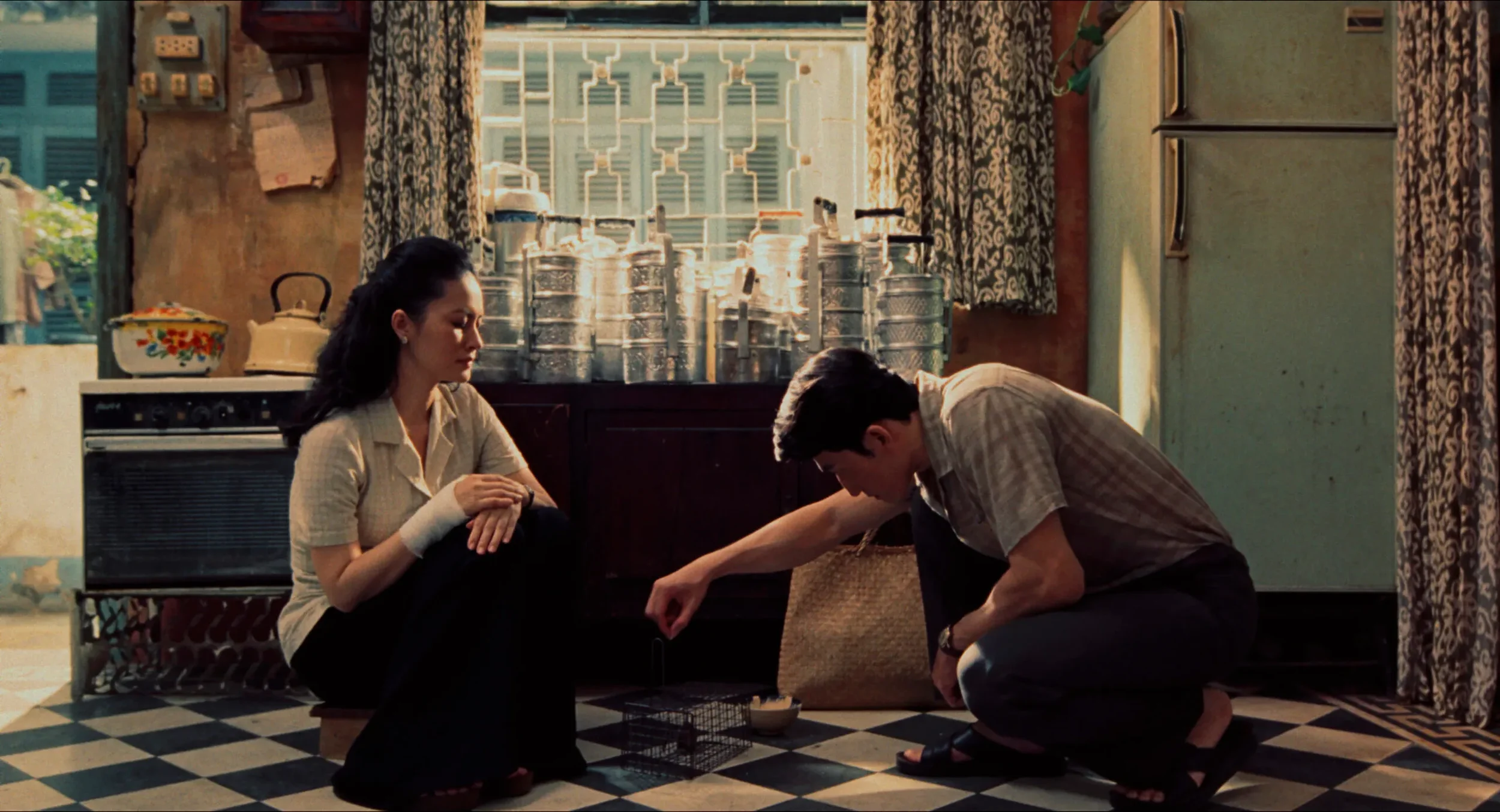‘Nang Maglublob Ako sa Isang Mangkok ng Liwanag’ REVIEW: A triumph of Philippine trans cinema
‘Nang Maglublob Ako sa Isang Mangkok ng Liwanag’ REVIEW: A triumph of Philippine trans cinema
Serena Marcusa and Jzar Tabilin star as Sunshine and Frena, respectively, in Nang Maglublob Ako sa Isang Mangkok ng Liwanag.
In June 2020, the Manila City police illegally arrested 20 individuals, which included 13 members of the LGBTQ+ community, during a Pride protest on Mendiola street. Dubbed the “Pride 20,” the protesters were calling for the passage of the SOGIE Equality bill and the junking of the Anti-Terrorism bill, which was being railroaded by the Philippine Congress at the time. The incident reflects former President Rodrigo Duterte’s obsession with draconian and militaristic measures, especially against dissenters and minorities, that had long existed even before the pandemic began.
In the country, the queer community, led by transgender activists like one of Pride 20’s Rey Valmores-Salinas, has always been at the forefront of struggles against cultural and material violence perpetrated by the state – a condition that is likely to continue, if not worsen, in another Marcosian rule following the successful return of the former dictator’s son to the Malacañang Palace. This triumph is anchored on a years-long effort at rebranding the Marcos name through disinformation and propaganda campaigns, a tactic that syncs with the playbook of modern autocrats.
While this information enriches one’s viewing experience of Kukay Zinampan’s Nang Maglublob Ako sa Isang Mangkok ng Liwanag, the 24-minute film doesn’t depend on it to work as a sensual drama about the trans community’s struggle for inclusive and safe spaces and genuine equality for all. Originally released in 2021, Nang Maglublob Ako sa Isang Mangkok ng Liwanag was awarded the Best Short Film in the recently concluded Pelikulaya LGBTQIA+ Short Film Competition, a project organized by the Film Development Council of the Philippines (FDCP). Ironically, the film agency is under the Office of the President of the Philippines, underscoring how the state has long co-opted artists and cultural workers to legitimize anti-people policies and historical distortions.
Progressive trans folks in the Global South never had it easy, especially in a country that is widely conservative and patriarchal; their existence always threatened to be erased, their stories tucked away on the fringes of cultural conversation.
But cinema, by hook or crook, tries to hold and create more space for these narratives. PJ Raval’s Call Her Ganda (2018) documents the brutal killing of transwoman Jennifer Laude whose murderer, US Marine Joseph Scott Pemberton, was recently granted an absolute pardon by Duterte, tracing the country’s complex relationship with imperialist forces. Films such as Eduardo Roy Jr.’s Quick Change (2013), Gerardo Calagui’s Mga Gabing Kasinghaba ng Hair Ko (2017), and Jun Robles Lana’s Big Night (2021) depict how trans liberation is, above all, a class struggle. Moreover, Lana’s Die Beautiful (2016) and Rod Singh’s Mamu; And A Mother Too (2018) offer incisive commentaries on parenthood within the trans community. Meanwhile, Xeph Suarez’s Si Astri maka si Tambulah (2017) and Isabel Sandoval’s Shangri-La (2021) both attempt to imagine better fates for their trans characters amid a landscape of repression.
Like its predecessors, Nang Maglublob Ako sa Isang Mangkok ng Liwanag is cut from the same cloth. But what the film brings new to the table is its intimate portrayal of “new normal” concepts that hinges on a unique trans/queer lens, accenting the current milieu but also refusing to be confined by it – a welcome departure from most (blockbuster) films produced in the middle of the rapidly changing health crisis that insist on being big.
Sunshine spends her morning in isolation.
In the film, trans friends Sunshine (Serena Marcusa) and Frena (Jzar Tabilin), along with their dog (cleverly named Kitty) and plants, navigate two weeks of isolation, evoking how lockdowns and quarantine restrictions impact the trans community beyond the physical sense. This reminds me of how local drag artists struggle to stay afloat, especially during the onset of the deadly virus in the country.
Sentimental to a fault, the characters’ feelings and frustrations were mainly delivered through voice-overs in which a prose poem was read, magnified by a brilliant soundscape, lending the film its emotional heft. Their day-to-day routine was replete with ordinary tasks: wake up, eat, water the plants, clean the pet’s feces, and sleep. Initially, one might find this treatment bland and uneventful. But the film’s specificity is what makes it a nuanced picture of ordinary people, who are often neglected in the world’s grand gesture of deterioration. It’s a story of the mundane but not a mundane story.
Zinampan’s direction takes advantage of a single setting, accompanied by a tight framing and an often-subdued light, to convey how the pandemic has stripped trans folks of critical components of their identity and freedom, or what Sunshine and Frena have called “our cruising selves, our plant selves, our sashaying, our smoking, our dog-tired from working selves.” It also reveals how, even beyond one’s home, spaces for the LGBTQ+ community, especially for transgender people, have always been limited or controlled by oppressive social institutions. So, through the viral disease, it becomes easier to further limit such spaces, particularly in the context of the Philippines. But what makes Nang Maglublob Ako sa Isang Mangkok ng Liwanag a fine piece is how it knows better not to compartmentalize LGBTQ+ issues and other material issues like food security and poverty. Because in the eyes of the powers that be and those in the upper echelons, we in the working and lower classes are all the same, which is to say, we are all vulnerable.
In a sense, the film acts as a way of reclaiming and resurfacing these stories that are often feared to be swept under the rug. It acts as resistance against systemic inequality and violence that have long placed the queer community on the periphery of society. It’s not often that Philippine cinema actually offers Filipino trans stories by Filipino trans artists. Nang Maglublob Ako sa Isang Mangkok ng Liwanag is proof that it is not enough to imagine a better world and humane conditions for our trans folks and queer siblings because only when we actively act on achieving this can it truly materialize, which speaks of what trans cinema really means.
But Zinampan is aware that the task doesn’t end here; that any cinematic effort can only do so much; that whatever rights the members of the LGBTQ+ community enjoy today have always been collectively fought for; that militancy is inherently embedded in Pride protests and the trans struggle. So, toward the end, the film asserts a refusal, “The time will come that I, we will not have to confine ourselves here,” as if to say we are here!
ABOUT THE AUTHOR
Lé Baltar is a writer, poet, and film critic. They are secretary of the Society of Filipino Film Reviewers (SFFR). Their articles have been published in Film Police Reviews, Philippine Collegian, Tinig ng Plaridel, and Vox Populi PH, while their poems have appeared in local and international literary spaces. They study journalism in UP Diliman.













